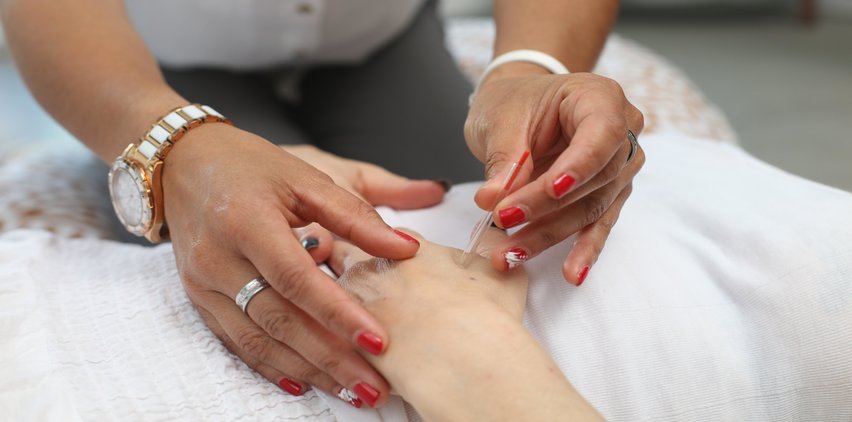

February 8, 2019 | Categories: Health Care
Would you welcome alternative or complementary therapies from medical caretakers if you thought they could help you heal faster from cancer or ease pain during and after treatments? NewYork-Presbyterian Hospital patients are saying, ‘Yes,’ and taking advantage of the myriad services the hospital offers to help them heal.
A multi-faceted approach to healthcare is important to NewYork-Presbyterian Hospital, particularly surgeon Sheldon M. Feldman, M.D., chief of breast surgery at NewYork-Presbyterian/Columbia. Dr. Feldman is recognized as one of “America’s Top Doctors” according to Castle Connelly Top Doctors’ list, but he is also a breast cancer surgeon at the forefront of offering Reiki therapy for breast cancer patients during surgery.
Reiki is an alternative therapy that heals by flowing through the affected parts of the energy field and charging them with positive energy through visualization techniques and without touch. It’s equivalent to a practitioner administering a type of massage to a patient during surgery. Dr. Feldman has found that using Reiki during surgery on his breast cancer patients leads to less bleeding, steady blood pressure and often patients tend to need less pain mediation after surgery than if they didn’t have Reiki during the operation.
When he was a third-year surgery resident at NYU in 1977, Dr. Feldman’s older sister, Fern, was diagnosed with stage IV breast cancer in her mid-30s. She lost her life to breast cancer two years later, leaving behind three small children.
Over the years, focusing on breast cancer became Dr. Feldman’s passion. He says his sister’s cancer journey taught him the importance of finding a “better way” for women enduring breast cancer treatments, and that even though it’s currently under-researched, he sees Reiki as an option to create that better way forward.
Dr. Feldman believes in holistic patient-centered approaches to surgery and supports using Reiki as a tool to help his patients withstand surgery, chemotherapy and radiation. “We know as scientists that a lot of things we do work, but haven’t been proven scientifically, and Reiki is one of those treatments that’s in that list of things for me,” he’s said in an interview. Dr. Feldman has said in an interview that he thinks having a Reiki master in the operating room helps elevate the experience and the spirit of being focused on the patient.
“Time, compassion, and human kindness goes so far in taking care of patients,” says Dr. Feldman. “Yes it’s high-tech, but it’s also high-touch. It’s really equally important.”
He has volunteered as a New York Reiki Conference (NYRC) speaker where he’s given presentations to an audience of Reiki masters and practitioners about how they might assist patients by bringing Reiki as a tool in support of allopathic (alternative) medicine. Dr. Feldman says that alternative therapies, including Reiki, are currently being used mostly on a case-by-case basis in response to the request or openness of certain patients.
Dr. Feldman created the breast cancer treatment center, “The Fern Feldman Anolick Breast Center” in Kingston, New York, out of gratitude for his sister’s life. He calls his sister his “guardian angel” and says she is a guiding light that helps him to make the tough decisions that are part of his work. “When I see a new patient with breast cancer, it’s my sister,” says Dr. Feldman. “For me, I feel that much of a personal connection with a patient and I demand that much of the team to make sure every step of the process, every detail is looked at carefully, that it be done in a very humane and compassionate way.”
Injecting human touch and reassuring patients that it will be okay is huge, he says. “Healing words are tremendous,” says Dr. Feldman. “You can be objective and scientifically rigorous, but still have compassion. That’s as important as the best surgical technique.”
NewYork-Presbyterian’s holistic approach to cancer treatment doesn’t just end with breast cancer patients. The Center for Comprehensive Wellness (CCW) within the Division of Pediatric Hematology/Oncology/Stem Cell Transplantation at Morgan Stanley Children’s Hospital offers complementary therapies like acupuncture, aromatherapy, and mind-body therapies (such as meditation) for children with blood cancer.
Using traditional Chinese medicine techniques of acupuncture and acupressure can help patients cope with specific ailments by stimulating strategic points on the body known as “acupoints.” Acupressure stimulates acupoints through touch. Acupuncture stimulates acupoints through the gentle insertion of small, fine needles. Some side effects of cancer treatment such as pain, fatigue, insomnia, and nausea may be alleviated or lessened by using these complementary care techniques. All of the CCW’s integrative and nutrition services are provided free of charge and are available in both inpatient and outpatient settings so your sick child may still receive these benefits even after they’ve returned home.
This article was written for NewYork-Presbyterian’s website in 2016.
Leave a Reply